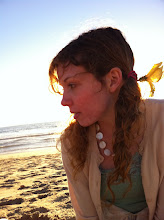Lesson One: Say Yes.
Theater is about accepting offers. Not the kind offer where someone is like, "Hey Eva, do you want this domestic arctic fox puppy and also this three-tiered chocolate cake?" and then I'm like, "Well, hell yes I would, Mr. Mysterious Stranger." No, unfortunately, not that kind of offer at all. More the kind of metaphorical offer where someone moves aggressively towards you like they're about to hit you, and that action is a sort of offer, and you have the option of accepting or denying the offer. If you accept you respond to the action, and either take a step back in alarm or preemptively deck this person in the face. If you deny the offer then you just sort of stand there indifferently because I guess maybe you think you're on a stage so no one is really going to hurt you and it's all just pretend anyway. And then you look really silly.
In real life, you should not only accept but also acknowledge and return the gestures of kindness, however small they may be, that the people around you make every day. You should also accept the challenges that people and situations present you with. You should rise to meet the occasion. And if someone happens to step forward like they're going to hit in real life instead of in theater class, you still probably shouldn't just stand there-- you probably should run, or else you probably should hit them first. But I don't know which way you swing. Either way, the main thing is that you should pay attention to what people are doing, what their intentions are, where and why and how fast they are moving... Which I guess makes me realize: Life isn't only a lot like acting--
It's also a lot like dancing.
Lesson Two: Commit.
It's not as important that you make the right choice as it is that you make a strong choice. If you're going to suddenly break out into an a cappella song in the middle of a monologue; okay. But then do it right. Sing so strong that it remakes the capacity of your lungs. And maybe that'll be the wrong choice, but at least it will be interesting. There's no point in being tentative. It will kill a scene. Likewise it will kill your chances at that job, or with that beautiful girl you haven't talked talked to yet who holds the burnt umber hair off the nape of her neck by twisting it up into a loop and sticking a chewed-up pencil through it. I guess all I'm saying is that if I'm going to run then I want it to be for miles. If I'm going to fight then I want it to be to the death. If I'm going to cry then I don't just want to feel it in my eyes, I want to feel it in my stomach and even in my thighs. And if I'm going to love then I want it to be the kind of love that rends me apart at the seams, the kind from which I don't think I can ever be redeemed. There just simply isn't any point in living life like a bad actor.
Lesson Three: The Only Difference Between a Comedy and a Tragedy is When the Curtain Falls.
Someone who was probably a lot smarter and a lot more knowledgeable about theater than me said that. I'm not sure who this person was, but I'm pretty sure that the person I heard this from John Kauffman. Anyway, I thought it was pretty fucking cool so I wrote it all caps in the margin of the notebook I had at the time. I think this is a better version of the saying 'If it's not okay, it's not the end', which always seemed like a nice idea but also kind of like bullshit. Let me be really clichéd for a second here and talk about Romeo and Juliet:
So there's these two starry eyed kids, at they meet, and they fall in love. And if the curtain falls there, it's a comedy. But it doesn't; it keeps going and shit goes down and in the end they die and romantics are proven to be hopeless. And the curtain does fall. And that's a tragedy. But what if it didn't? If it didn't then everything would be pretty gloomy in Verona for a while, but eventually life would go on and there would be other lovers who would find one another, and if the curtain fell there-- well that would be a comedy again. I'm not even going to explain how this applies to real life, because other than fewer conversations held in sonnet form, I don't think real life is all that different from Shakespeare.

